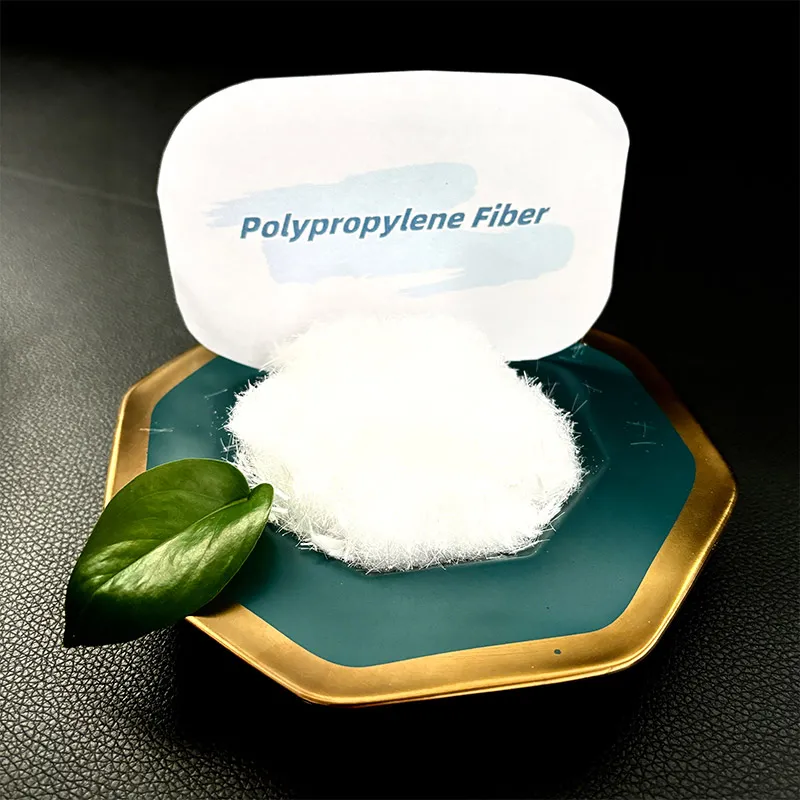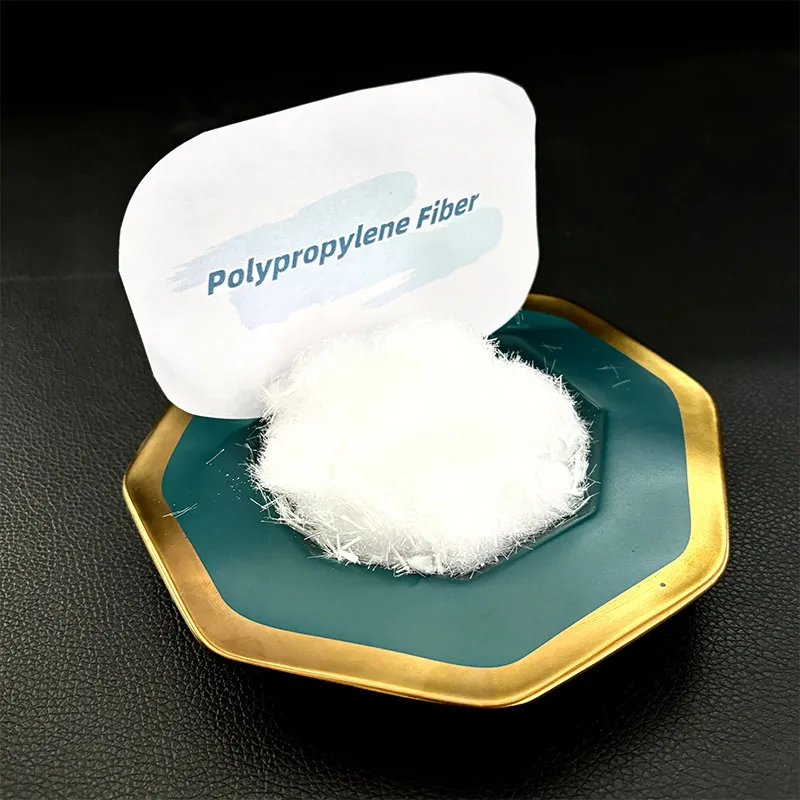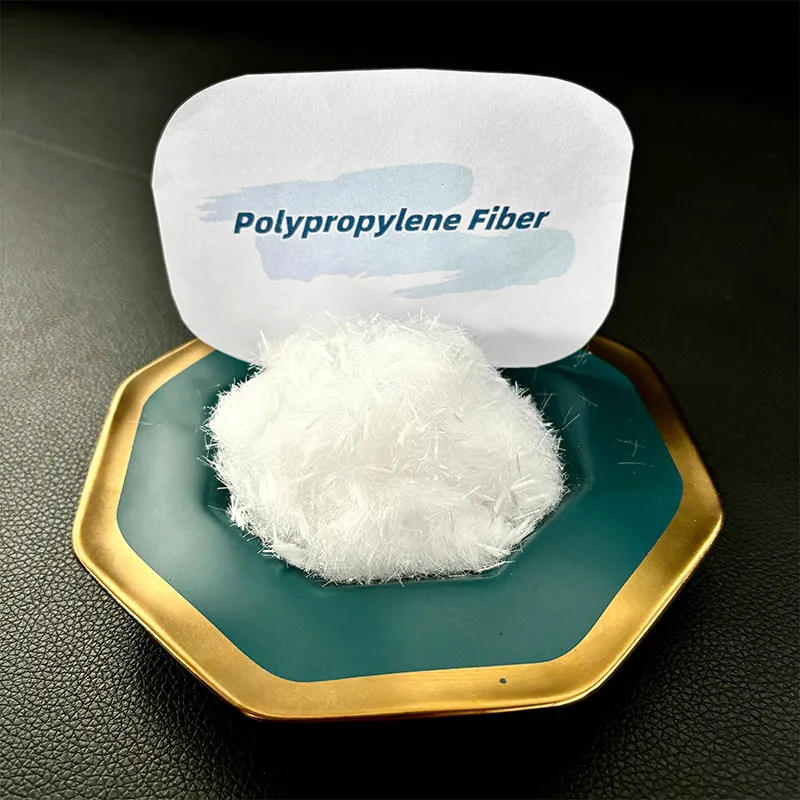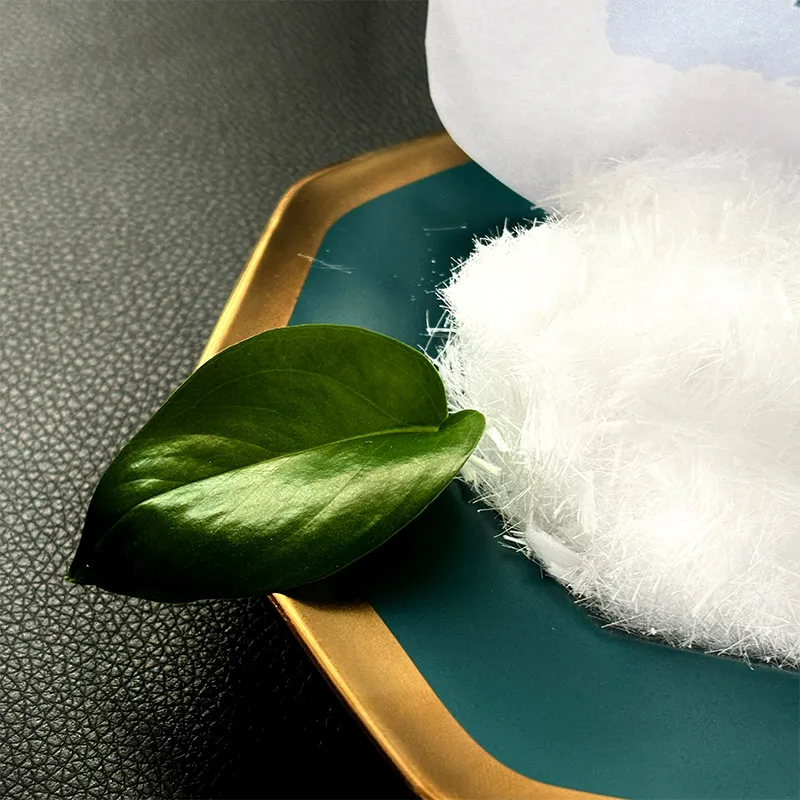
-

Add: HeBei ShengShi HongBang Cellulose Technology CO.,LTD.
-

Email
13180486930@163.com -

CONTACT US
+86 13180486930

High-Strength Polypropylene Fiber for Concrete Reinforcement
The Strategic Importance of Polypropylene Fiber in Modern Engineering
In the rapidly evolving landscape of construction and material science, the demand for advanced, high-performance additives is paramount. Polypropylene fiber stands out as a critical innovation, offering a myriad of benefits that address common challenges in concrete and other composite materials. Its unique properties, including chemical inertness, high tensile strength, and excellent dispersion, position it as an indispensable component for enhancing durability, crack resistance, and overall structural integrity. Industry trends indicate a growing adoption of advanced fibers in infrastructure projects, driven by the need for more resilient and sustainable constructions capable of withstanding harsh environmental conditions and heavy loads. This shift underscores the strategic importance of integrating high-quality polypropylene fiber into modern engineering practices to achieve superior material performance and extend service life.
The increasing focus on sustainable building practices and long-term asset performance further amplifies the value of polypropylene fibre. Its ability to mitigate plastic shrinkage cracking, improve impact resistance, and enhance freeze-thaw durability contributes directly to reduced maintenance costs and extended structural lifespans. For B2B decision-makers and technical personnel, understanding the nuanced capabilities of this material is crucial for making informed choices that optimize project outcomes. From large-scale industrial flooring to intricate architectural designs, the application of microfiber synthetic solutions like pp fiber is transforming traditional construction methodologies, offering a robust and cost-effective alternative to conventional reinforcement methods.
Unveiling the Manufacturing Excellence of Polypropylene Fiber
The production of high-performance polypropylene fiber involves a meticulous manufacturing process, primarily utilizing a melt spinning or extrusion technique. This advanced method ensures the consistent quality and optimal characteristics required for demanding engineering applications. The journey begins with high-grade polypropylene resin pellets, which are fed into an extruder. Inside the extruder, the polymer is melted at precisely controlled temperatures, typically ranging from 200°C to 280°C, to form a homogeneous molten mass. This molten polymer is then forced through a spinneret, a die with multiple fine holes, forming continuous filaments. The diameter and shape of these holes directly influence the final fiber denier (a unit of linear mass density of fibers, defining fineness) and cross-sectional profile, which are critical for fiber performance.

Visual representation of the polypropylene fiber extrusion and drawing process.
Upon exiting the spinneret, the nascent filaments are immediately cooled, often by air or water, to solidify the polymer. The subsequent drawing or stretching stage is crucial for aligning the polymer chains, which significantly enhances the fiber's tensile strength and modulus. This process can involve multiple drawing steps at varying temperatures and speeds to achieve desired mechanical properties. Finally, the drawn fibers are either cut into specific lengths (short-cut fibers for concrete) or processed into continuous filaments, then crimped or fibrillated depending on their intended application. Quality control is maintained throughout, with rigorous testing for parameters like fiber length, diameter, tensile strength, elongation, and alkali resistance. Adherence to international standards such as ASTM D7336 for tensile strength and elongation, and ISO standards for quality management, ensures that each batch of pp fiber meets stringent performance requirements, guaranteeing a long service life in demanding environments.
This meticulous control over the manufacturing process ensures that the finished polypropylene fibre exhibits superior properties for various applications, particularly in enhancing the durability and performance of concrete structures. The precise handling of material and process parameters contributes to the fiber's chemical inertness, making it resistant to acids, alkalis, and salts, which is crucial for its longevity in concrete. The absence of corrosion, unlike steel, makes polypropylene fiber an excellent choice for infrastructure in harsh environments.
Technical Prowess: Polypropylene Fiber Specifications & Performance
Understanding the technical specifications of polypropylene fiber is essential for optimizing its application and ensuring peak performance in various engineering projects. Key parameters include fiber length, diameter (or denier), tensile strength, modulus of elasticity, melting point, and specific gravity. These characteristics directly influence the fiber's dispersion within a matrix, its ability to bridge cracks, and its overall contribution to the composite material's mechanical properties. For instance, varying fiber lengths are tailored for specific uses: shorter fibers (e.g., 6mm or 12mm) are ideal for crack control in concrete, while longer fibers (e.g., 19mm or 38mm) might be used for specialized applications requiring higher toughness.

Demonstrating the uniform dispersion of polypropylene fiber within a concrete mix.
The following table provides a typical range of parameters for high-quality pp fiber suitable for concrete reinforcement, reflecting standards often required by projects adhering to ASTM C1116 "Standard Specification for Fiber-Reinforced Concrete."
These detailed specifications allow engineers and contractors to select the appropriate polypropylene fiber variant for their specific project needs, whether it's for mitigating plastic shrinkage cracking in slabs, enhancing spall resistance in high-temperature environments, or improving the overall toughness of pavement overlays. The non-corrosive nature and chemical stability of microfiber synthetic options like pp fiber concrete make them a superior choice for applications where long-term durability and resistance to environmental degradation are critical.
Revolutionizing Industries: Key Applications of Polypropylene Fiber
The versatility and high-performance attributes of polypropylene fiber have led to its widespread adoption across a multitude of industries, fundamentally transforming traditional material approaches. Its primary application lies in the construction sector, specifically as a reinforcement in concrete and mortar. Here, pp fiber concrete excels in mitigating plastic shrinkage cracking, a common issue in newly placed concrete that can lead to premature failure. By uniformly distributing throughout the mix, these fibers create a vast internal network that arrests micro-cracks before they propagate, significantly enhancing the material's toughness and durability. This benefit is particularly critical for industrial floorings, pavements, and precast concrete elements, where long-term performance and reduced maintenance are paramount.

Industrial flooring reinforced with polypropylene fiber for enhanced crack resistance.
Beyond crack control, polypropylene fibre also improves impact resistance, abrasion resistance, and freeze-thaw durability, making it an ideal choice for structures exposed to harsh environmental conditions or heavy traffic. For example, in bridge decks and tunnel linings, the addition of pp fiber enhances resistance to spalling and disintegration, particularly under fire conditions, by creating pathways for steam to escape. This feature is crucial for improving safety and structural integrity in critical infrastructure. Furthermore, its non-corrosive nature makes it suitable for applications in marine environments or structures exposed to de-icing salts, where traditional steel reinforcement might be susceptible to rust and degradation.
Other significant applications include the textile industry for non-woven fabrics, geotextiles, and ropes, benefiting from its strength-to-weight ratio and moisture resistance. In filtration, microfiber synthetic materials offer excellent chemical resistance and fine filtration capabilities. For B2B clients, choosing a reliable supplier of polypropylene fiber ensures access to solutions that not only meet stringent technical specifications but also contribute to significant cost savings over the lifecycle of projects by reducing repair and replacement needs. The diverse utility of this material underscores its pivotal role in advancing engineering solutions across sectors from petrochemical processing to water management and infrastructure development, where enhanced durability and energy efficiency are critical.
Strategic Advantages: Why Choose Advanced Polypropylene Fiber Solutions
The adoption of advanced polypropylene fiber solutions offers a compelling array of strategic advantages for engineering and construction projects, translating directly into enhanced performance, reduced costs, and improved long-term reliability. One of the primary benefits is the superior crack control it provides, particularly against plastic shrinkage cracking in fresh concrete. By uniformly distributing millions of microscopic fibers, pp fiber creates a three-dimensional network that effectively arrests the development of micro-cracks, which are often the precursors to larger, more problematic fissures. This leads to a more durable and aesthetically pleasing surface, minimizing the need for costly and time-consuming repairs.

Enhanced integrity of a concrete slab due to polypropylene fiber reinforcement.
Furthermore, polypropylene fibre significantly enhances the toughness and impact resistance of concrete. This is crucial for structures subjected to dynamic loads, such as industrial floors, airport pavements, and bridge decks. The fibers absorb and dissipate energy from impacts, reducing spalling and localized damage. Unlike steel mesh, which can corrode over time and lead to concrete deterioration, polypropylene fiber is chemically inert and highly resistant to acids, alkalis, and salts. This non-corrosive property ensures exceptional long-term durability, especially in harsh environments, reducing lifecycle costs and minimizing environmental impact associated with repairs and replacements.
The ease of incorporation into concrete mixes is another practical advantage. Polypropylene fiber can be simply added at the batching plant or on-site, requiring no special equipment or complex procedures, thereby streamlining operations and reducing labor costs compared to traditional steel mesh installation. Its lightweight nature also simplifies handling and transportation. For B2B clients, these technical and operational advantages combine to offer a compelling return on investment (ROI) through extended service life, reduced maintenance, and improved project efficiency. The overall enhanced structural performance of microfiber synthetic solutions contributes to more resilient and sustainable infrastructure, meeting modern demands for high-quality, long-lasting construction.
Ensuring Quality and Trust: Standards and Certifications
In the specialized B2B sector, trust and reliability are paramount, particularly when dealing with critical construction materials like polypropylene fiber. Our commitment to excellence is underpinned by adherence to stringent international quality management systems and product certifications. We proudly operate under ISO 9001:2015 standards, which govern our manufacturing processes and ensure consistent product quality from raw material sourcing to final delivery. This certification provides our clients with the assurance that every batch of polypropylene fiber meets rigorous quality control benchmarks. Furthermore, our products are engineered to comply with relevant industry standards such as ASTM C1116 "Standard Specification for Fiber-Reinforced Concrete" and EN 14889-2 "Fibers for Concrete," which specify the requirements for synthetic fibers intended for use in concrete.

Rigorous quality control measures applied to polypropylene fiber production.
Our long-standing service record and partnerships with leading construction firms and material suppliers worldwide serve as a testament to our authoritativeness in the field of pp fiber. We regularly provide comprehensive test data and performance reports, including tensile strength, elongation, and dispersion characteristics, all verified by independent third-party laboratories. This transparency in data and commitment to verifiable results builds invaluable trustworthiness with our clients. Our dedicated research and development team continuously monitors industry advancements and collaborates with academic institutions to ensure our polypropylene fibre solutions remain at the forefront of material science innovation.
Beyond product quality, we believe in fostering strong client relationships through consistent support and comprehensive service. Our technical support team, with decades of combined experience in material science and civil engineering, is available to provide expert guidance on product selection, dosage rates, and optimal mixing procedures for pp fiber concrete. This holistic approach, combining certified products with expert support, ensures that our clients achieve the best possible outcomes for their projects, reinforcing our position as a trusted partner in high-performance construction materials.
Tailored Solutions & Collaborative Partnerships
Recognizing that every B2B project presents unique challenges and specifications, we specialize in developing customized polypropylene fiber solutions designed to meet the precise requirements of our clients. Our approach begins with a thorough consultation to understand the specific application, environmental conditions, and performance goals. Whether it's a particular fiber length, denier, or surface treatment for enhanced bonding, our engineering team works closely with clients to tailor a pp fiber product that optimizes performance and cost-efficiency. This bespoke service extends to offering custom packaging options and specific delivery schedules to align with complex project timelines.
Our experience spans a wide range of application cases, from reinforcing large-scale industrial concrete slabs subjected to heavy loads to specialized precast elements requiring superior finish and durability. For instance, in a recent industrial flooring project, our customized polypropylene fiber blend reduced plastic shrinkage cracking by over 60% compared to unreinforced concrete, leading to significant cost savings in post-placement crack repair. In another case, our specifically engineered polypropylene fibre was crucial in enhancing the fire resistance of tunnel linings, providing critical spall control at high temperatures and ensuring enhanced safety in crucial infrastructure. These successes highlight our capability to deliver not just a product, but a complete, optimized solution.
We believe in fostering long-term collaborative partnerships. This involves continuous feedback loops, post-project performance analysis, and ongoing technical support. Our goal is to be more than just a supplier; we aim to be an extension of your engineering team, providing the expertise and reliable products necessary to achieve your project objectives with utmost confidence. This commitment to partnership and tailored solutions ensures that clients receive optimal value from our microfiber synthetic products.
Addressing Common Queries: Polypropylene Fiber FAQ
Q1: How does polypropylene fiber prevent cracking in concrete?
Polypropylene fiber prevents cracking, particularly plastic shrinkage cracking, by uniformly distributing throughout the concrete mix. As the concrete begins to set and water evaporates from the surface, tensile stresses develop. Without fiber reinforcement, these stresses lead to uncontrolled cracking. The millions of individual fibers create a dense internal network that acts as a physical barrier, bridging the micro-cracks as they form and distributing the tensile stresses more evenly throughout the matrix, thereby preventing their propagation into larger, visible cracks. This controlled crack mitigation significantly improves the durability and aesthetics of the concrete surface.
Q2: Is polypropylene fiber a substitute for steel reinforcement?
Typically, polypropylene fiber is used for secondary reinforcement, primarily to control plastic shrinkage and thermal cracking, enhance impact resistance, and improve abrasion resistance. It is generally not considered a direct substitute for primary structural steel reinforcement (e.g., rebar or steel mesh) which carries structural loads and provides post-cracking strength in applications requiring significant flexural or tensile capacity. However, in many non-structural or lightly loaded applications like slab-on-grade floors, pavements, and precast elements, pp fiber can often replace conventional steel mesh for crack control, offering benefits such as reduced installation time, lower material cost, and elimination of corrosion concerns. Consult with structural engineers and project specifications to determine the appropriate type and amount of reinforcement.
Q3: What dosage rate should be used for pp fiber concrete?
The optimal dosage rate for polypropylene fiber in concrete varies depending on the specific application, desired performance, and fiber type (monofilament, fibrillated). For basic plastic shrinkage crack control, common dosage rates range from 0.6 kg to 1.0 kg per cubic meter of concrete. For enhanced performance, such as improved impact resistance or fire spall control, higher dosages (e.g., 2.0 kg to 5.0 kg/m³) might be recommended. It is always advisable to conduct trial mixes and consult with our technical specialists to determine the most effective dosage for your particular project, ensuring optimal dispersion and desired mechanical properties without affecting concrete workability.
Commitment to Excellence: Delivery, Warranty, and Support
Our commitment to our B2B partners extends beyond providing superior polypropylene fiber products; it encompasses a comprehensive service model designed to ensure seamless project execution and long-term satisfaction. We understand the critical importance of timely material delivery in large-scale construction projects. Our robust logistics network and efficient supply chain management enable us to offer flexible and reliable delivery schedules tailored to your project timelines. Standard delivery for most orders typically ranges from 7-14 business days within major regions, with expedited options available upon request for urgent requirements. Each shipment is meticulously packaged to preserve product integrity during transit.
We stand behind the quality and performance of our polypropylene fiber with a comprehensive product warranty. Our fibers are guaranteed to meet the specified technical parameters and performance characteristics as outlined in our product data sheets, provided they are stored and used according to recommended guidelines. This warranty reflects our confidence in our manufacturing processes and the quality of raw materials used. In the unlikely event of any product deviation or performance issue, our dedicated customer support team is readily available to address concerns, provide technical assistance, and facilitate prompt resolutions, ensuring minimal disruption to your operations.
Our technical support extends throughout the entire project lifecycle, from initial consultation and product selection to on-site assistance and post-application evaluation. Our experienced engineers and material scientists offer expert advice on dosage rates, mixing procedures for pp fiber concrete, and best practices for achieving optimal results. This proactive and responsive support system underscores our dedication to forging trusted, long-term partnerships with our clients, ensuring that every application of our polypropylene fibre contributes to a successful and durable outcome.
Conclusion: The Future of High-Performance Polypropylene Fiber
As global infrastructure demands continue to grow, the role of advanced materials like polypropylene fiber becomes increasingly critical. Its proven ability to enhance concrete durability, control cracking, and improve impact resistance offers significant advantages over traditional reinforcement methods. By combining cutting-edge manufacturing processes with rigorous quality control, we deliver pp fiber solutions that meet the exacting standards of modern engineering projects. Our commitment to principles—Expertise in material science, extensive Experience in diverse applications, Authoritativeness through certifications and partnerships, and unwavering Trustworthiness in our support—positions us as a leading partner for B2B clients seeking high-performance, cost-effective, and sustainable construction materials. Embracing polypropylene fibre is not just an investment in a product, but a strategic decision towards more resilient, long-lasting, and efficient infrastructure development.
References
- American Society for Testing and Materials. (2020). ASTM C1116/C1116M-20: Standard Specification for Fiber-Reinforced Concrete.
- European Committee for Standardization. (2006). EN 14889-2: Fibers for concrete — Part 2: Polymer fibers — Definitions, specifications and conformity.
- ACI Committee 544. (2002). State-of-the-Art Report on Fiber-Reinforced Concrete (ACI 544.1R-96). American Concrete Institute.
- Bentur, A., & Mindess, S. (2007). Fibre Reinforced Cementitious Composites. CRC Press.
- Ohama, Y. (1998). Handbook of Polymer-Modified Concrete and Mortars. Noyes Publications.
-
The Function of Polymer Powder in Thin-Bed MortarsNewsAug.25,2025
-
Polypropylene Fiber for Waterproofing MembranesNewsAug.25,2025
-
Starch Ether as a Thickener in Construction GroutsNewsAug.25,2025
-
Rubber Powder as a Sustainable Additive in GroutsNewsAug.25,2025
-
Gypsum Retarder Chemical Dosage and Its Precise EffectsNewsAug.25,2025
-
Using HPMC to Reduce Cracking in Cementitious ProductsNewsAug.25,2025
-
Wood-Based FibresNewsAug.20,2025











